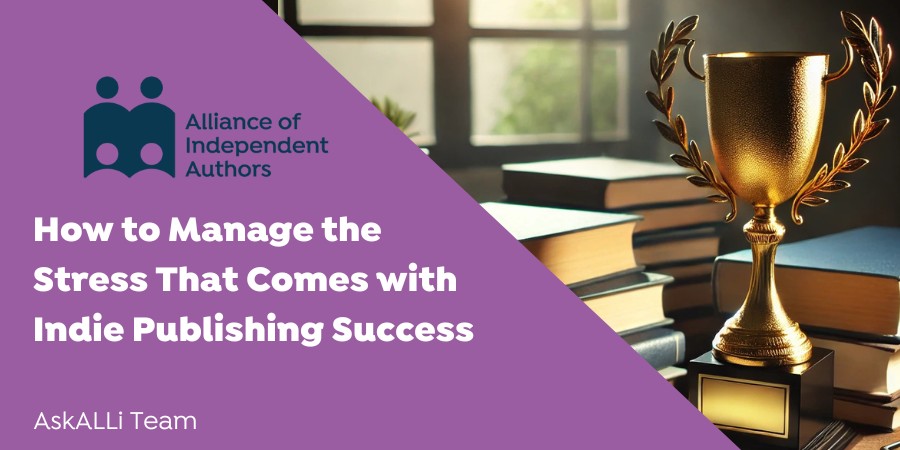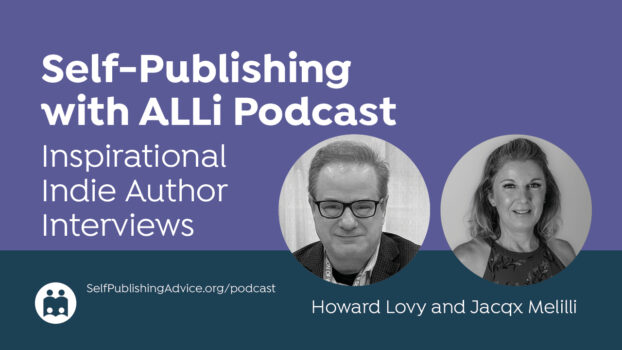Indie publishing success can take many forms—whether it's financial stability, creative freedom, or building a loyal audience—but achieving it often brings unexpected challenges and stresses along the way. Three ALLi authors—M.K. Williams, Russell Nohelty, and Tom Evans—have faced these challenges firsthand and offer insights into managing success once it arrives.
For some, like Williams, success required recalibrating her goals. Nohelty dealt with the financial unpredictability that came with a larger audience, while Evans found ways to maintain creativity even after achieving major milestones. Their stories reveal that success is rewarding, but managing it effectively is essential for long-term fulfillment. And, as Orna Ross noted in an article about the psychology of success, adopting a growth mindset can be crucial in handling the complexities of success.
The Complex Nature of Indie Publishing Success

M. K. Williams
Success can mean different things to different authors. M.K. Williams discovered that the success she achieved with her Author Your Ambition books and coaching didn’t align with her true goal of becoming a full-time novelist.
“I had set out to be a full-time author, but I should have clarified my dream,” she said.
Williams found herself spending more time on nonfiction and coaching, sidelining her passion for fiction writing. This realization led her to refocus on what success truly meant for her.
In contrast, Tom Evans approached success with a mindset of curiosity and adventure. Rather than chasing financial success, Evans focused on learning and enjoying the process.
“Those who engage primarily for fun, adventure, and learning have the best time of it,” he said. By maintaining this approach, Evans was able to sustain his creative energy and avoid burnout.
Orna Ross, founder and director of the Alliance of Independent Authors, has spoken about the importance of authors adopting a “growth mindset”—the belief that one can always develop new skills and resources to achieve their goals. She emphasizes that this mindset, as opposed to a fixed mindset, allows authors to view success as part of a continuous journey, rather than a final destination.
Psychological Pressure of Public Recognition

Russell Nohelty
As visibility grows, authors often face new challenges. Russell Nohelty discovered that public recognition brought pressures he hadn’t anticipated.
“There are things you can get away with when you're unknown that you can't when you have a bigger profile,” he explained.
As his audience expanded, Nohelty found that making his work more accessible was crucial, but it also forced him to adapt his communication style to appeal to a broader audience.
“I found it hard to find ways to be palatable to more people without losing my own inner voice and attitude,” he added.
Financial Pressures and Business Management
For many authors, financial success comes with its own set of challenges. Russell Nohelty knows firsthand the unpredictability that comes with managing cash flow and income streams.
“I can tell you every input and output of my business, and it’s still impossible to get a true grasp on why things are successful,” Nohelty said.
Despite keeping a healthy financial buffer in his business account, there are always moments of uncertainty.
“Sometimes I'll be running promotions perfectly, and then there's a wall that goes up and everything stops working,” he said.
Nohelty’s experience emphasizes the need for authors to be financially prepared, even during periods of success. Having a financial plan and gathering as much data as possible are key strategies to manage the unpredictability.
Social Media and Public Exposure

Tom Evans
Social media is a powerful tool, but it can also become overwhelming if not managed carefully. M.K. Williams experienced this as her YouTube channel and nonfiction books gained popularity.
While these activities brought her financial success, they also shifted her focus away from fiction writing, pulling her away from her original goals. Managing an online presence can be a double-edged sword, requiring authors to set boundaries to avoid burnout.
Tom Evans took a different approach, using social media to connect with a niche audience on his own terms. By focusing on enjoyment and learning, Evans was able to maintain a healthy balance between engaging with his audience and sustaining his creative energy.
Sustaining Motivation and Purpose
Achieving success can sometimes lead to a loss of motivation. M.K. Williams had to rediscover her passion for fiction after realizing that her nonfiction work was taking up too much of her time. By setting boundaries and dedicating time to her creative writing, she was able to sustain both her business and her artistic fulfillment.
Tom Evans stayed motivated by approaching his projects with a mindset of curiosity. Treating each new project as a personal journey of discovery allowed him to maintain enthusiasm even after hitting major milestones.
Russell Nohelty, on the other hand, found that mindset work was essential for sustaining motivation. He invested time into understanding himself through tools like the Enneagram and CliftonStrengths, which helped him navigate the psychological challenges that come with success.
The Enneagram is a personality system that divides people into nine types, each representing different ways of interacting with the world. Understanding his type allowed Nohelty to recognize patterns in his behavior and manage his reactions more effectively.
CliftonStrengths is a strengths-based assessment that identifies a person’s top talents, encouraging them to focus on what they naturally do best. By aligning his work with his strengths, Nohelty stayed motivated and avoided burnout.
“Honestly, mindset is like 90 percent of it,” he said. His focus on self-awareness and inner work allowed him to stay clear-headed during times of uncertainty, helping him push through creative or business obstacles.
This reflects Orna Ross’s point that a growth mindset allows authors to continually develop and improve, sustaining their motivation even after achieving traditional markers of success. By staying open to learning and growth, authors can keep their creative energy alive.
Conclusion
Success in indie publishing isn’t a final destination—it’s a journey that evolves over time. As M.K. Williams, Russell Nohelty, and Tom Evans have shown, success brings new challenges, but with thoughtful planning and a clear sense of purpose, authors can continue to thrive.
For Williams, it meant recalibrating her goals. Nohelty focused on managing financial uncertainty, while Evans found balance by maintaining a sense of curiosity. As Orna Ross has emphasized, having a growth mindset is crucial to sustaining long-term success, allowing authors to stay open to learning, evolving, and finding fulfillment in their work. Ultimately, the key to long-term fulfillment lies in continually redefining success on your own terms.
Thoughts or further questions on this post or any self-publishing issue?
 If you’re an ALLi member, head over to the SelfPubConnect forum for support from our experienced community of indie authors, advisors, and our own ALLi team. Simply create an account (if you haven’t already) to request to join the forum and get going.
If you’re an ALLi member, head over to the SelfPubConnect forum for support from our experienced community of indie authors, advisors, and our own ALLi team. Simply create an account (if you haven’t already) to request to join the forum and get going.
Non-members looking for more information can search our extensive archive of blog posts and podcast episodes packed with tips and advice at ALLi's Self-Publishing Advice Center.




